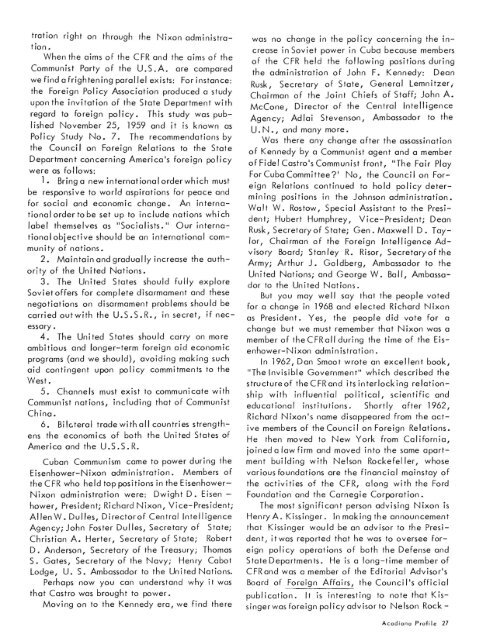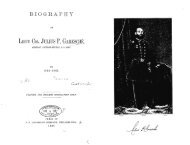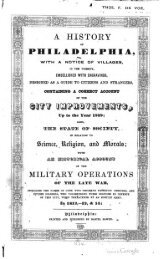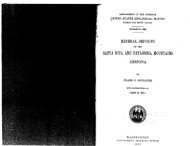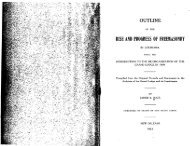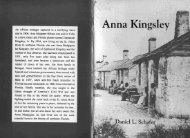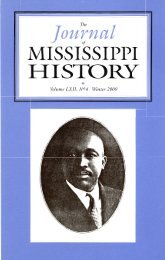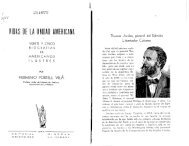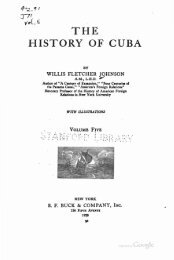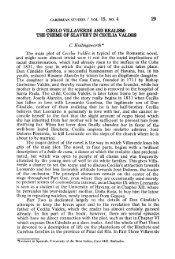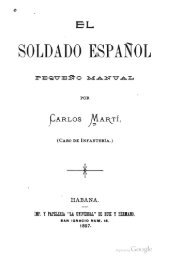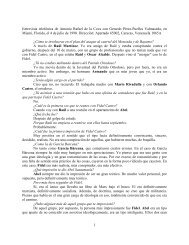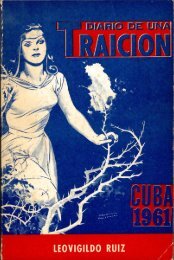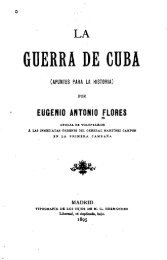Cubano in the 'Cajun Country - Latin American Studies
Cubano in the 'Cajun Country - Latin American Studies
Cubano in the 'Cajun Country - Latin American Studies
You also want an ePaper? Increase the reach of your titles
YUMPU automatically turns print PDFs into web optimized ePapers that Google loves.
tration right on through <strong>the</strong> Nixon adm<strong>in</strong>istration.<br />
When <strong>the</strong> aims of <strong>the</strong> CFR and <strong>the</strong> aims of <strong>the</strong><br />
Communist Party of <strong>the</strong> U.S.A. are compared<br />
we f<strong>in</strong>d a frighten<strong>in</strong>g parallel exists: For <strong>in</strong>stance:<br />
<strong>the</strong> Foreign Pol icy Association produced a study<br />
upon <strong>the</strong> <strong>in</strong>vitation of <strong>the</strong> State Department with<br />
regard to foreign policy. This study was published<br />
November 25, 1959 and it is known as<br />
Pol icy Study No.7. The recommendations by<br />
<strong>the</strong> Counci I on Foreign Relations to <strong>the</strong> State<br />
Department concern<strong>in</strong>g America's foreign policy<br />
were as follows:<br />
1. Br<strong>in</strong>g a new <strong>in</strong>ternational order wh ich must<br />
be responsive to world aspirations for peace and<br />
for social and economic change. An <strong>in</strong>ternational<br />
order to be set up to <strong>in</strong>clude nations whi ch<br />
label <strong>the</strong>mselves as "Socialists." Our <strong>in</strong>ternational<br />
objective should be an <strong>in</strong>ternational community<br />
of nations.<br />
2. Ma<strong>in</strong>ta<strong>in</strong> and gradually <strong>in</strong>crease <strong>the</strong> authority<br />
of <strong>the</strong> United Nations.<br />
3. The United States should fully explore<br />
Soviet offers for complete disarmament and <strong>the</strong>se<br />
negotiations on disarmament problems should be<br />
carried outwith <strong>the</strong> U.S.S.R., <strong>in</strong> secret, if necessary.<br />
4. The United States should carry on more<br />
ambitious and longer-term foreign aid economic<br />
programs (and we should), avoid<strong>in</strong>g mak<strong>in</strong>g such<br />
aid cont<strong>in</strong>gent upon policy commitments to <strong>the</strong><br />
West.<br />
5. Channels must exist to communicate with<br />
Communist nations, <strong>in</strong>clud<strong>in</strong>g that of Communist<br />
Ch<strong>in</strong>a.<br />
6. Bi Ie. tera I trade wi th a II countries streng <strong>the</strong>ns<br />
<strong>the</strong> economi cs of both <strong>the</strong> Uni ted States of<br />
America and <strong>the</strong> U.S.S.R.<br />
Cuban Communism came to power dur<strong>in</strong>g <strong>the</strong><br />
Eisenhower-Nixon adm<strong>in</strong>istration. Members of<br />
<strong>the</strong> CFR who held top positions <strong>in</strong> <strong>the</strong> Eisenhower<br />
Nixon adm<strong>in</strong>istration were: Dwight D. Eisen <br />
hower, President; Richard Nixon, Vice-President;<br />
AllenW. Dulles, Directorof Central Intelligence<br />
Agency; John Foster Dulles, Secretary of State;<br />
Christian A. Herter, Secretary of State; Robert<br />
D. Anderson, Secretary of <strong>the</strong> Treasury; Thomas<br />
S. Gates, Secretary of <strong>the</strong> Navy; Henry Cabot<br />
Lodge, U. S. Ambassador to <strong>the</strong> United Nations.<br />
Perhaps now you can understand why it was<br />
that Castro was brought to power.<br />
Mov<strong>in</strong>g on to <strong>the</strong> Kennedy era, we f<strong>in</strong>d <strong>the</strong>re<br />
was no change <strong>in</strong> <strong>the</strong> policy concern<strong>in</strong>g <strong>the</strong> <strong>in</strong>crease<br />
<strong>in</strong> Soviet power <strong>in</strong> Cubd because members<br />
of <strong>the</strong> CFR held <strong>the</strong> follow<strong>in</strong>g positions dur<strong>in</strong>g<br />
<strong>the</strong> adm<strong>in</strong>istration of John F. Kennedy: Dean<br />
Rusk, Secretary of State, General Lemnitzer;<br />
Chairman of <strong>the</strong> Jo<strong>in</strong>t Chiefs of Staff; John A.<br />
McCone, Director of <strong>the</strong> Central Intelligence<br />
Agency; Adlai Stevenson, Ambassador to <strong>the</strong><br />
U.N., and many more.<br />
Was <strong>the</strong>re any change after <strong>the</strong> assass<strong>in</strong>ation<br />
of Kennedy by a Communist agent and a member<br />
of Fidel Castro's Communist front, "The Fair Play<br />
ForCubaCommittee?' No, <strong>the</strong> Council on Foreign<br />
Relations cont<strong>in</strong>ued to hold policy determ<strong>in</strong><strong>in</strong>g<br />
positions <strong>in</strong> <strong>the</strong> Johnson adm<strong>in</strong>istration.<br />
Walt W. Rostow, Special Assistant to <strong>the</strong> President;<br />
Hubert Humphrey, Vice-President; Dean<br />
Rusk, Secretaryof State; Gen. Maxwell D. Taylor,<br />
Chairman of <strong>the</strong> Foreign Intelligence Advisory<br />
Board; Stanley R. Risor, Secretaryof <strong>the</strong><br />
Army; Arthur J. Goldberg, Ambassador to <strong>the</strong><br />
United Nations; and George W. Ball, Ambassador<br />
to <strong>the</strong> Un i ted Nations.<br />
But you may well say that <strong>the</strong> people voted<br />
for a change <strong>in</strong> 1968 and elected Richard Nixon<br />
as President. Yes, <strong>the</strong> people did vote for a<br />
change but we must remember that Nixon was a<br />
member of <strong>the</strong>CFRal1 dur<strong>in</strong>g <strong>the</strong> time of <strong>the</strong> Eisenhower-Nixon<br />
adm<strong>in</strong>istration.<br />
In 1962, Dan Smoot wrote an excellent book,<br />
"The Invisible Government" which described <strong>the</strong><br />
structureof <strong>the</strong>CFRand its <strong>in</strong>terlock<strong>in</strong>g relationship<br />
with <strong>in</strong>fluential political, scientific and<br />
educational <strong>in</strong>stitutions. Shortly after 1962,<br />
Richard Nixon's name disappeared from <strong>the</strong> active<br />
members of <strong>the</strong> Council on Foreign Relations.<br />
He <strong>the</strong>n moved to New York from California,<br />
jo<strong>in</strong>ed a law firm and moved <strong>in</strong>to <strong>the</strong> same apartment<br />
bui Id<strong>in</strong>g with Nelson Rockefeller, whose<br />
various foundations are <strong>the</strong> f<strong>in</strong>ancial ma<strong>in</strong>stay of<br />
<strong>the</strong> activities of <strong>the</strong> CFR, along with <strong>the</strong> Ford<br />
Foundation and <strong>the</strong> Carnegie Corporation.<br />
The most significant person advis<strong>in</strong>g Nixon is<br />
Henry A. Kiss<strong>in</strong>ger. In mak<strong>in</strong>g <strong>the</strong> announcement<br />
that Kiss<strong>in</strong>ger would be an advisor to <strong>the</strong> Presiden<br />
t, it was reported that he was to oversee foreign<br />
policy operations of both <strong>the</strong> Defense and<br />
State Departments. He is a long-time member of<br />
CFRand was a member of <strong>the</strong> Editorial Advisor's<br />
Board of Foreign Affairs, <strong>the</strong> Council's official<br />
publication. It is <strong>in</strong>terest<strong>in</strong>g to note that Kiss<strong>in</strong>ger<br />
was foreign policy advisor to Nelson Rock-<br />
Acodiono Profile 27


